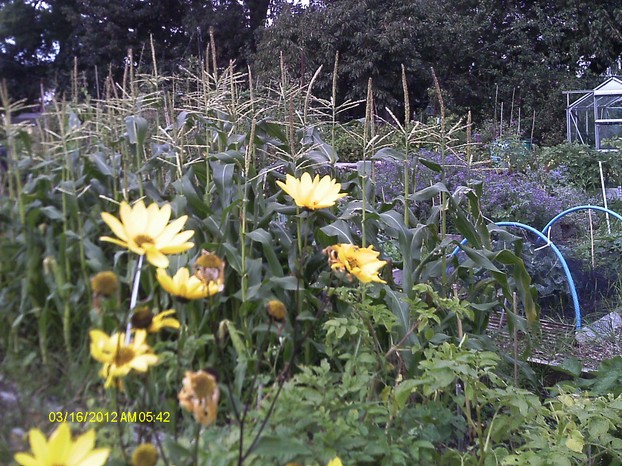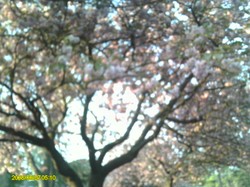I love walking, as many of you know, but it has always been the case that I prefer walking in parks and countryside to walking in urban areas, though there are some cities,such as Rome, where walks are delightful. But I am not alone, just one of a multitude of humans, for human nature seems to need natural beauty. So one important human quality that must be respected by all public health programmes is biophilia, the love of nature.

Biophilia: the love of nature
by frankbeswick
While nature is for some traditional economists a resource for the economy, it is source of spiritual, mental and emotional well being.
The Experience of Nature
There are some golden memories, moments of experience when you are immersed in the loveliness of nature. I recall one such time. I was hiking in May 1968 through the North Downs, the chalk ridge south of London, and had just passed Charles' Darwin's home at Downe. It was an English Spring day, warm and wet, as the intermittent May showers came through the leafy canopy through which I hiked. The overwhelming memory of the wood was of the glorious profusion of bluebells that dominated the ground. The rain came down on me, and I reckoned little or nothing of it, for the overwhelming sense was of the beauty of the scene. I felt that I was not just looking at it, as happens when we see a picture, but that somehow I was part of it, immersed in the experience; and I was renewed, rejuvenated, and refreshed, filled with a sense of joy. That I still remember the experience joyfully after 49 years speaks of its power to impress and entrance me.
Coincidentally, years later when I was reading Springtime in Britain [see below] the author, an American Anglophile, told of how in the same year and the same month he had enjoyed walking in the same woodland. Did we miss each other by minutes, hours or days, we shall never know. But what is true is that we both were entranced by the beauty of the scene, and this indicates that beauty is not merely a subjective preference, as the apologists for modern art claim,but something real and deeply rooted in nature. It has an impact on our minds and implications for our well being.
The term biophilia was coined by the psychologist Erich Fromm to indicate the instinctive bond that humans have with the natural world. We are not just beasts to be watered, fed and housed, or consumers to be courted and seduced by goods and services. We do not just need material goods, we need the great trilogy, The True, the Good and the Beautiful, for our total well being, spiritual, emotional and physical. Richard Mabey wrote Nature Cure, which detailed the role of the natural world in curing his deep depression.
Furthermore, Dr Wiliam Bird, an English medic, spent several years researching the role of nature in healing not just the body, but the mind. Much of his work involved collating research, some of which shows that merely fifteen minutes in quality green spaces lowered blood pressure, stress and toxin levels in the blood and made improvements in cognitive performance and memory. Any physical exercise taken provided added advantages, but you could get the beneficial effects by just sitting and looking. Interestingly, looking at pictures of natural beauty provided some beneficial effects, but not to the level of being present in it. It is as though our minds need immersion in the total environment rather than just a facsimile of it that we get in books and art. Bird's study shows that hospital patients who can see green space from their wards recover significantly faster than those who cannot.
Springtime in Britain
 |
| Springtime in Britain;: An 11,000 mile journey through the natural ... |
Theories
Several explanations of biophilia have been given, some of which are influenced by neurology. This information was taken from an article by Bernard Sheridan in The Horticulturalist, the magazine of the Chartered Institute of Horticulture, of which I am a member.
Edward O.Wilson, a well-known biologist claimed that humans are "hard wired" to be happier and function better in nature. He links this with his beliefs that our species evolved for millennia living in natural surroundings. Like many evolutionary explanations it is a contribution to a broader philosophical explanation that includes it, but is not reducible to it. Note the computer analogy, which indicates that Wilson is assuming that the mind is in some way analogous to a computer. This may be an error, as it treats the mind as a self-contained machine, whereas it is in interplay with the world in which it is immersed.
Attention Restoration Theory claims natural environments allow human brains to recharge. Our urban activities may be economically necessary, but they drain us. For example, I make several thousand pounds a year from marking examination papers, but they drain me and there are only so many that I can do in a day, whereas I find working on the allotment, while it physically tires me, is mentally refreshing.So I think that there is some truth in this theory, but as I said previously, it is part of a wider explanation that deals with the whole of our humanity.
Psychological Stress Theory focuses on the facts that there is a recognized lowering of blood pressure,pulse rate, stress and toxin levels and anxiety in people exposed to fifteen minutes of presence in quality green space, by which I mean space which is safe and not litter strewn. Again the given explanation is genetic hard wiring.
My own view is that we must begin from the principle that mind and body interact in an intricate and subtle way, with mental stress causing bodily illness and physical hardships having mental consequences, so clearly, exposure to pleasant experiences will have beneficial consequences for physical health. We can chart the chemicals involved without making the reductionist error of thinking that chemicals are the full explanation. Philosophy and Science are moving away from the reductionist approach which regards bodies as explicable in terms of their parts and are taking up the view that we need to see the human psycho-physical system as an integral whole, a view promoted by Rupert Sheldrake, whose works are well worth reading.
We must realize that some activities are performed not because they are meaningful in themselves but because they are instrumentally useful for making wealth. While they are necessary, I believe that they can be an emotional drain; whereas activities that are good in themselves are emotionally satisfying and refresh us. The True, the Good and the Beautiful are good in themselves, and all that is truly worthy is reducible to these three values, and one great source of beauty in our lives is nature. It is for this reason that we turn to nature to refresh our spirits. We drink from the great well of divinely provided beauty. The Blessing for our minds spills over into a blessing for our bodies.
Nature Cure
 |
| Nature Cure |
Implications
So how can we make the most effective use of this knowledge? Nature can range from wilderness to a park or garden. Wilderness is inspiring, but not many can cope with it, and you do not need it to enjoy nature. We have little wilderness in Britain, but there are areas of mountain country, sheep range, that come close to it. I find that I can enjoy a walk through a one of these areas, and enjoy the solitude, for example the North Carneddau in Wales, where I once walked for four hours without seeing another human being. But you don't need wilderness to enjoy nature, and you need not have absolute silence, just quietness is enough.
Today I enjoyed nature at the allotment. There were some people there at first, and I conversed with some of them, but most of the time I was working alone, watering my potato drills and young onions against Britain's dry Spring, then planting peas and stripping dead twigs from the plum tree. Perhaps the secret of enjoying nature is not to be content to blend it with human living, with the cultural activity that we call gardening and with encounters with people. We cannot enjoy nature as much when we are crowded with people, but having a few round makes the occasion more satisfying.
To enjoy nature we need to walk and shed our concerns, just let go of what is worrying us. Recently as chair of an allotment society I have had to deal with a potentially serious administrative problem, now thankfully near resolution, that has been worrying me. So when I go to my own plot I try to let go and enjoy the contact with nature.
Our enjoyment of nature can range from delighting in the panorama down to delighting in the microcosm of a single flower. We can enjoy by sitting or we can relish nature while walking. We can enjoy the sights, the sounds and the scents. There is such a variety of richness awaiting our relishing.
"Man does not live by bread alone"says Jesus to the tempter, [Matthew 4:4.] There are needs more than the merely material and higher than it. Society needs to ensure that it protects areas of natural beauty, for they nurture the Spirit.
I finish with a quote from the Jesuit poet, Gerald Manley Hopkins from his poem Inversnaid. Hopkins, like his fellow Jesuit Teilhard de Chardin combined a deep religious faith with a devotion to the natural world and love of its wonder and beauty.
"What would the world be once bereft
Of wet and wildness? Let them be left,
Let them be left,wildness and Wet;
Long live the weeds and the wilderness yet.
1881
 Frank Beswick |
You might also like
Myths Uncovered about Southern StereotypesHollywood, politics, the media, and others choose to paint Southerners as dum...
Newly Single, Now What?Newly single and struggling? Things you can do to ease the transition from be...



 Darkness over the Earth the skies darkened when Jesus was crucified24 days ago
Darkness over the Earth the skies darkened when Jesus was crucified24 days ago
 TheThousand Year Gardenon 11/26/2025
TheThousand Year Gardenon 11/26/2025
 Women of the Gospelson 10/11/2025
Women of the Gospelson 10/11/2025
 Religious Gardenson 08/25/2025
Religious Gardenson 08/25/2025



Comments
Well done!
It appears to be 6:05 p.m. in the United Kingdom even as it is 2:05 p.m. here.
How do I know this?
There's "The Arboricultural Association Women in Arboriculture Working Group presents a special International Women’s Day Webinar 'Tree careers' with Cecily Withall and Louise Hackett.
Cecily Withall of Royal Botanic Gardens, Kew - Arboriculture Team is part of Kew’s ‘Tree Gang’, a team of seven arborists (including two apprentices) who manage over 12,000 trees at Kew Gardens in London.
Louise Hackett is the Sherwood Treescape Lead at the Woodland Trust, focused on ancient and veteran trees working with Partners and Landowners.
Sharon Durdant-Hollamby is an Expert Witness, chartered arboriculturist and Director of Sharon Hosegood Associates Ltd. Following thirteen years’ experience as a tree officer, Sharon went into private practice in 2005 where she began in private practice as managing director of a multi-disciplinary environmental consultancy, for eight years. She formed Sharon Hosegood Associates in 2014, which is an arboricultural consultancy specialising in trees in relation to development. She is the immediate past president of the Institute of Chartered Foresters and a Fellow of both the Institute of Chartered Foresters and the Arboricultural Association. She is the host of Tree Lady Talks podcast."
Is it widely known that Kew has 12,000-plus trees? Is it widely known that the Sherwood Major Oak memorializes Major Hayman Rooke (Feb. 20,1723-Sep. 18,1806)?
Now I know!
I do not know. We all have our little eccentricities.
The elm tree-based jonquils bloomed Sunday and the ephemeral pool-based spring peepers cheep since Saturday even as the blue jay and the eastern bluebird respectively call "thief!" names and "purty, purty [= pretty]" compliments since the weekend too.
The temperature commenced at 69 degrees Fahrenheit (20.55 degrees Celsius) this morning!
(Relatedly and unrelatedly, why did Stephen Hawking always give the temperature equivalent of degrees Fahrenheit as in degrees Centigrade instead of identifying it as degrees Celsius?)
Any. I like them all
Thank you!
The planting groups also add to convenient, easy care with everything together.
(Musk melons are perhaps popularest United States-wise. What melons do you favor?)
Plant them in groups so that pollen can be spread by air.
Thank you!
Your comment three boxes down considers indoor space for planted cucumbers, melons and tomatoes.
Would you pot them near each other or scattered all by their lonesomes?
I have never grown chick peas, and sweet potatoes in my area need a glsshouse, so I have not given them much attention, but there is no reason that they cannot grow in conjunction.
Thank you!
Chickpeas and sweet potatoes are such attractive plants. They bring forth such versatile edibles.
Do you have any suggestions as to whether or not to grow them together or to locate them near -- if such be the case -- more companionable plants?